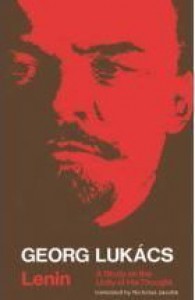Currently reading
Middlemarch: An Authoritative Text, Backgrounds, Reviews and Criticism (A Norton Critical Edition)
The Magic Mountain
Love in the Time of Cholera
Lukacs: Lenin Study Unity His Thought
 Written in part as an elegy upon Lenin's decease, and in part as insurance against author's own impending liquidation--for his magnum opus, [b:History and Class Consciousness|189598|History and Class Consciousness Studies in Marxist Dialectics|György Lukács|http://d.gr-assets.com/books/1347272329s/189598.jpg|183295], had been "condemned by Soviet authorities in 1924 at the fifth World Congress of the Comintern" (Jay, [b:Marxism & Totality|179794|Marxism and Totality The Adventures of a Concept from Lukacs to Habermas|Martin Jay|http://d.gr-assets.com/books/1348683728s/179794.jpg|173708], at 103)--this book is a funny little thing.
Written in part as an elegy upon Lenin's decease, and in part as insurance against author's own impending liquidation--for his magnum opus, [b:History and Class Consciousness|189598|History and Class Consciousness Studies in Marxist Dialectics|György Lukács|http://d.gr-assets.com/books/1347272329s/189598.jpg|183295], had been "condemned by Soviet authorities in 1924 at the fifth World Congress of the Comintern" (Jay, [b:Marxism & Totality|179794|Marxism and Totality The Adventures of a Concept from Lukacs to Habermas|Martin Jay|http://d.gr-assets.com/books/1348683728s/179794.jpg|173708], at 103)--this book is a funny little thing. Jay avers that even Lukacs' enemies recognized the HCC as "the first book in which philosophical Marxism ceases to be a cosmological romance and thus a surrogate 'religion' for the lower classes" (loc. cit. at 102). According to Kolakowski, no friend of marxism, the HCC "criticized Engels' idea of the dialectic of nature" and "disputed the theory of 'reflection' which Lenin had declared to be the essence of Marxist epistemology" (Kolakowski, [b:Main Currents of Marxism: The Breakdown|143294|Main Currents of Marxism The Founders, the Golden Age, the Breakdown|Leszek Kołakowski|http://d.gr-assets.com/books/1347363774s/143294.jpg|2432629], at 260). In jolly commie land, that means your ass.
It is unlikely that this slim volume can be properly understood without reference to the HCC; I'm not going to make that reading here--it's too hard. But one should rest assured that all of the generic hegelocommietalk herein actually signifies something.
In this context, Lukacs publishes this study of Lenin. It begins poorly with a bizarre declaration that "historical materialism is the theory of the proletarian revolution" (9). Um, yeah? We can measure "the stature of a proletarian thinker" with reference to "the extent to which he is able accurately to detect beneath the appearances of bourgeois society those tendencies towards proletarian revolution which work themselves in and through it to their effective being and distinct consciousness" (id.). In what can only be considered a very limited or backhanded compliment, Lukacs submits that "by these criteria Lenin is the greatest thinker to have been produced by the revolutionary working-class movement since Marx" (id.). The remainder of the book works through standard marxist categories of analysis in evidencing this thesis.
The key concern is that the "actuality of the revolution" is the "core of Lenin's thought" (11). This means that theory is transformed into praxis by the dialectical revolutionist. So, against the Mensheviks and Bernstein/Kautsky types, Lenin did not accept that the backward Russian empire was unsuitable for socialism for lack of successful bourgeois revolution in economics or politics; rather, "the bourgeoisie had ceased to be a revolutionary class" having allied with the "old ruling powers," a "compromise which springs from mutual fear of a greater evil and not a class alliance based on common interests" (20). This sleight of mind allows the bolsheviks to seize the state, despite the prior dispositions of marxist theory to the contrary.
Lenin is presented as inferior to Hilferding in economics and to Luxemburg on the issue of imperialism--but Lenin trumps because of "his concrete articulation of the economic theory of imperialism with every political problem of the present epoch" (41). In the penultimate chapoter, Lenin is presented as a compromiser, practitioner of realpolitik, contrary to the posturing of Herr Pipes in his sophomoric histories.
1967 coda backs off the primary text in some ways, suggesting that Lenin's theory of imperialism is invalid after all (91). Some odd references to Shakespeare in the postscript, and a surreal fundamentalist bit about "human salvation" early in the primary essay (11).
Jay presents this volume as one in which "virtually all residues of his ultra-leftist sectarianism were purged from the argument" (loc. cit. at 120). Kolakowski, for his part, correctly summarizes this text as using "the notion of Totalitat to describe the core of Lenin's doctrine," but then goes way off the rails into disingenuous fantasy by suggesting Lukacs' position is that Lenin "discerned the revolutionary trend of the age independently of particular facts and events, or rather in the facts themselves, and united all current issues" (loc. cit. at 267).
Anyway, recommended for western marxists and rabid but bored anti-communists.





